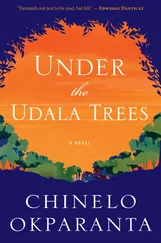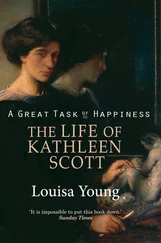A picture of Ezioma and her husband hung on another wall, smiling faces. In the picture, her husband wore a light-green agbada and sokoto. He had the look of an Oga, which perhaps he was, all that travelling he did. But there had been no gatemen guarding the gate, like big men often had. And there were no housegirls to be seen. In fact, the house itself was modest at best. But no matter, Nneoma thought. She turned from the picture to tackle the matter for which she had come.
There were two doors, one on each side of the corridor. There was a third door straight ahead. None of the doors was quite pulled closed. She pushed the one ahead first. She saw the toilet, a sink, the bath stall. Some towels hanging on a rack. She pulled the door back — not all the way closed, but just the way it had been.
She turned to her left. She pushed that door slowly. She felt her breath catch as it opened. What if things were exactly the way she expected they’d be? She’d cry, she thought. She’d cry for poor Ezioma. But she’d be grateful to the dibia. And she’d be grateful for the baby.
She entered the room. She could see a lump on one side of the double bed. That scent of rotten soup was stronger now than before. She moved closer, went directly to the lump. She found Ezioma there, just lying down, her blanket pulled up to her chest.
Nneoma began to cry then. She flipped the blanket from Ezioma’s chest. She touched Ezioma’s belly. It was stiff. She bent her head to be closer, listening for signs of life in Ezioma’s rigid belly. She could not have been sure, but somehow Nneoma knew then that the baby had not survived. She moaned. She imagined Ezioma being buried in that cemetery across from the Staff School compound. She imagined the baby being buried with her. It infuriated her, the thought. She pounded her fist into the mattress, narrowly missing Ezioma’s body. Over and over again, she pounded. Then she curled into a ball at the side of the bed. She cried, but there was no-one to hear.
It was afternoon by the time Nneoma picked herself up from the floor. She wiped her eyes with the hem of her blouse, which had by then sneaked out from underneath her wrapper. She did not have to look for the phone. It was there, sitting on the bedside table, on the other side of the bed. She picked it up, dialled the school. Obinna picked up. Mr Nkangineme. She told him exactly how it was. Almost exactly, anyway. She told him of the way she had found Ezioma — still sleeping in bed, only more than sleeping: dead. She told him that she’d been in shock, that she’d been curled up, crying by Ezioma’s side all this time.
‘My God!’ he exclaimed. Then, ‘Miss Enwere, I’m so sorry for your loss.’ His tone was sympathetic.
Now, in church, the pregnant woman listened, expressed her sympathy as Nneoma told the story.
As she did with Mr Nkangineme, Nneoma left out any mention of her role in all of it — no mention of her visits to the dibia, no mention of the dibia’s potion, or of its use in the preparation of the food she served Ezioma that Sunday lunch long ago. She did not tell the woman that part of her devastation about the situation was in the knowledge that she had sacrificed Ezioma but had wound up with no child after all.
What she did tell the woman was that all of this happened over a decade ago. Twelve years, to be exact. She was twenty-eight years old at the time.
‘I’m sorry,’ the woman said now, moving to embrace Nneoma. ‘Ndo.’ She repeated it, whispered it. Sorry.
For a moment, Nneoma remembered the pastor, his ban on hugs. She thought that perhaps the pastor was wrong. Perhaps hugs did nothing to scare the visitors away. Well, ban or not, here she was being embraced by this visitor. How she had missed these embraces! How long had it been since the last time someone held her this way? Very long — in fact, so long that she did not remember. She would savour it, then: she leaned into the embrace, grateful for it. She breathed in the musty scent of the woman. It was nourishing and comforting, the embrace.
Just as soon as the woman released her, Nneoma’s thoughts were back to Ezioma again, and she remembered the days after she lost Ezioma and the baby, how she’d thought she heard people talking about her, gossiping about her being unmarried, about her being childless. Mgbaliga. Nwanyi-iga. ‘Empty barrel. Old maid,’ the voices said. She heard them as she walked down to the market, as she rode the bus on her errands, even in school she heard the whispers. The whispers scolded, ridiculed, condemned.
Her parents appeared to be whispering too, each time Nneoma stopped by to visit them in the village. They’d shake their heads disappointedly, and it seemed to her that they muttered something about how she would soon be past childbearing age. It seemed to her that they muttered things like, ‘All your friends are leaving you behind. Won’t you do something about it?’
There, seated in the church beside the woman, Nneoma began to hear the voices again: Mgbaliga. Nwanyi-iga. MGBALIGA. NWANYI–IGA. She shook her head, trying to shake the voices away. To no avail. Then all the words of the day were mixing up in her head. Praise God. Confession. Nwanyi-iga. Sin. Creatures. Blessings. Di-gi, o no ebe? Mgbaliga!
She continued to shake her head, furiously now. Soon her thoughts were racing with the same things with which they raced around this period in her scheme: how happy she would be if it worked this time. How much she would love and nurture the child, never taking her eyes away from it. She would name the child Ekwutosina, if it were a girl. Cease your gossiping. An answer to those whispers. And, if it were a boy, Chukwuemeka. God has been very generous to me. Also an answer to the whispers.
‘You should allow yourself to move on,’ the woman said.
‘Yes. I really should,’ Nneoma replied emphatically. ‘But it’s hard.’
‘What are you doing this evening?’ the woman asked. ‘You should drop by my house. All that with Ezioma was so long ago. You need to try to get over it. Come over. I’ll prepare food. We’ll eat. I will help you take your mind off it. We will talk of other things, get to know each other better. My husband will be busy working on the house. He won’t disturb.’
Nneoma nodded, accepted. ‘Da’lu. Imela,’ she said. Thank you. ‘What shall I bring?’
The woman waved her hand as if to say, Don’t worry about it . ‘Just bring yourself,’ she said.
‘Oh no, I must bring something,’ Nneoma said. ‘It wouldn’t be right.’
The woman nodded. ‘Okay,’ she said. ‘If you insist. Bring whatever you want.’
Nneoma nodded and thanked the woman again. Then she watched as the woman stood up finally to leave. The church was mostly cleared out now.
The woman paused. ‘Are you all right?’ she asked, her voice soft and concerned.
‘Yes,’ Nneoma replied. ‘I will come this evening,’ she said to the woman. But her mind was drifting again. She thought of the potion now. It had failed with Ezioma. It had failed with the women who came after Ezioma, all three of them. They had taken their babies along with them, just like Ezioma.
Suddenly Nneoma was doubtful. They were all such kind women, Nneoma thought. What sense was there in continuing to waste their lives like this?
She wondered if she should bother with this woman. No, she decided. She said it aloud: ‘No!’
‘Are you okay?’ the woman asked again.
Nneoma grew even more doubtful. This doubt was not, had never been part of the plan. She rose from the bench. ‘No,’ she said to herself, softer now. ‘Maybe I won’t go after all.’ Her intention now was to head out of the church — to walk in the direction of the nearest staircase, to go outside for fresh air. But beneath her the floor seemed to shake. She sat back down on the bench. Soon it appeared to her that the walls of the church were collapsing: a crumbling cake. She heard loud screaming and thuds of racing feet. She wanted to run too, but her legs refused to move. Her heart was beating fast, faster. It was a struggle to catch her breath. ‘No more,’ she said, very boldly. ‘Not this evening. Not ever again.’ But even as she said it, a part of her still hoped. It was a deep-seated hope borne of nothing more than habit. It was a desperate one, this hope. It was the hope that the woman would insist.
Читать дальше












